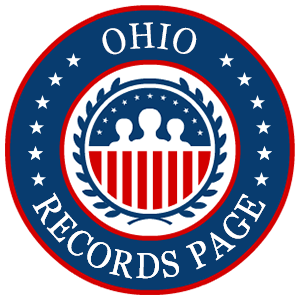Track down free Ohio marriage records through official record custodians and search tools today.
Gain insight about who’s married in the state via this brief yet in-depth resource. Ohio counties serve as the primary custodians of marriage records; these marriage documents are available for anyone to search, thanks to the state’s Public Records Act.
Obtaining marriage records can help individuals learn more about someone’s past or expand their genealogical research. Find out how to look up a marriage license in Ohio with this streamlined article.
Are Marriage Records & Licenses Open Records in Ohio?
The Ohio Public Records Act allows citizens to access a wealth of information, including marriage licenses.1 This broad law allows anyone to request a copy of a public record without providing a reason. This law is good news for record seekers because it allows them to secure marriage licenses in Ohio with ease.
People have many reasons for seeking out such records. If they’re newly married, having a certified copy of their marriage license on hand can be helpful when they’re applying for a loan, obtaining a passport, or applying for an adoption. In other cases, people want to tap into these records to learn more about someone’s marital status.
They may even want to conduct a marriage background check to find out if their soon-to-be spouse has been wed before. Marriage records are also helpful during genealogical research, giving people insight into their family’s history. For these reasons and more, citizens may choose to run a free marriage license search in Ohio.
In addition to obtaining marriage licenses through Ohio public records custodians, individuals can access state archives to support their genealogy research. Additionally, third-party providers also offer this information, but unless the state endorses the provider, any records found can’t be used for official purposes.
Another way to learn about Ohio matrimony is through the U.S. Census Bureau’s American Community Survey. This data gives insight into trends in the state, including who’s married and who isn’t.
The 2022 American Community Survey reported that 47.3% of Ohio residents ages 15 and older are currently married, and 33.5% have never been married.2 Additionally, 11.7% of Ohioans are divorced, 6% are widowed, and 1.5% are separated.
How To Look Up Ohio Marriage Records for Free
Often, citizens begin their search for marriage records at the state level, contacting the vital statistics office for this data. Ohio is unique in that all marriage record requests are managed at the county level.
According to the Ohio Department of Health’s Vital Statistics Office, all marriage record requests should go through county probate courts, as the state-level office does not collect this information. So, a search for marriage records in the state should begin at the county level, as explained below. Explore this list of Ohio county probate courts to kick off a records search.3
This resource will also explain how to obtain marriage records through state archives, which can be helpful for genealogical research. Read on to learn more about how to look up a marriage license in Ohio.
Searching the County in Ohio Where the Marriage Occurred
The search for marriage records begins with county probate courts. These county-level agencies serve as the official records custodians of marriage licenses in Ohio.
So, knowing where the Ohio marriage was held can help you identify which county probate court to contact for a record. Here are some tips on securing marriage records from the state’s three largest counties.
Franklin County is home to Columbus, the state capital. The Franklin County Probate Court is the go-to resource for marriage records. Order a marriage record online through the probate court.
Copies cost $2 each, payable by credit card, plus a $1 transaction fee. Citizens will need to provide both parties’ full names, the marriage date, and their contact information to process their request.
Citizens can also access an online marriage license index to obtain records of unions in Franklin County occurring from January 3, 1995 to present.4 They can search Franklin County marriages by name or wedding date.
Results will show both parties’ full names and all relevant dates, including when they applied for a marriage license, when the certificate was returned, and when they were married. While this online search doesn’t provide the physical copy of a marriage record, it’s a quick and convenient way to verify a union.
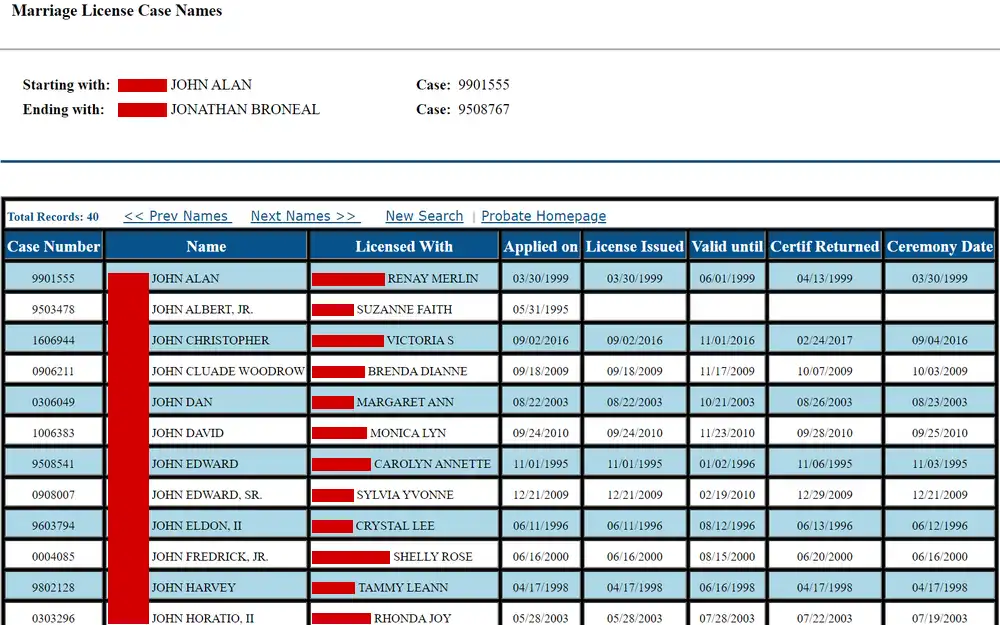
Citizens who need a copy of the marriage license can also submit their record requests via mail or email. No official form is required, but they need to include both parties’ names, the year of marriage, and their contact information.
They can mail their request, along with a self-addressed, stamped envelope and a $2 cashier’s check or personal check, to the address below. Alternatively, they can send the above information to the email address listed below, and the office will contact them about payment.
Finally, citizens are welcome to stop by the Franklin County Probate Court to make a request in person. They will need to provide the names of the husband and wife and the marriage year and pay the $2 fee to obtain the record. Individuals can call ahead to schedule an appointment or walk in.
The office is open Monday through Friday from 8 a.m. to 4:30 p.m., but citizens should arrive no later than 4 p.m. daily to process their request.
Franklin County Probate Court
373 S. High St., 23rd Floor
Columbus, OH 43215
Mailing Address:
Attention: Certified Desk
373 S. High St., 22nd Floor
Columbus, OH 43215
Phone: (614) 525-3894
E-mail: [email protected]
Cleveland’s Cuyahoga County also issues marriage records from its probate court office. Citizens can obtain quick information on marriages using the probate court’s Online Case Docket Search.5
Enter one individual’s name, the year (if known), and choose marriage as the case category. Then, click the individual’s name in the search results for additional information.
One important caution with this case docket search is that the historical marriage index for the county lists all unions with a date of 1900, which isn’t accurate. The probate court can confirm the actual wedding date in person, over the phone, or via email. Or, individuals can place an online order for a certified copy of the marriage license, which will reflect the correct wedding date.
After clicking the party’s name, select “request full case copy” and complete the payment and mailing information. Certified copies ordered online cost $4 ($2 for the license plus a $2 convenience fee) and are payable by credit or debit card.
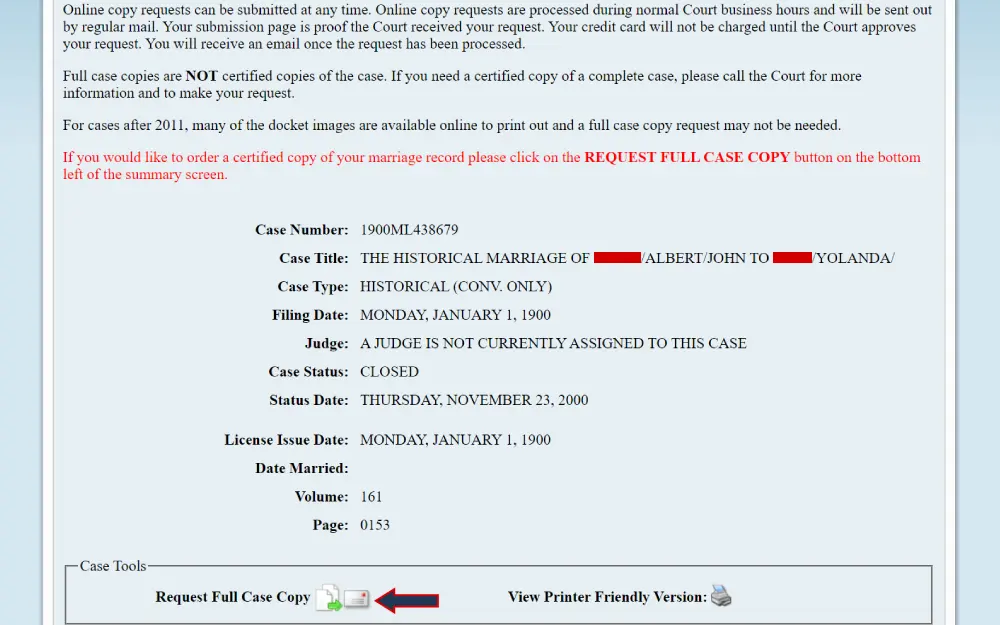
Individuals can also request a certified copy of a marriage license by mail. Complete the Request for Certified Copy of Marriage Certificate form and mail it to the below address with a self-addressed, stamped envelope and a cashier’s check or money order made payable to the Cuyahoga County Probate Court.6
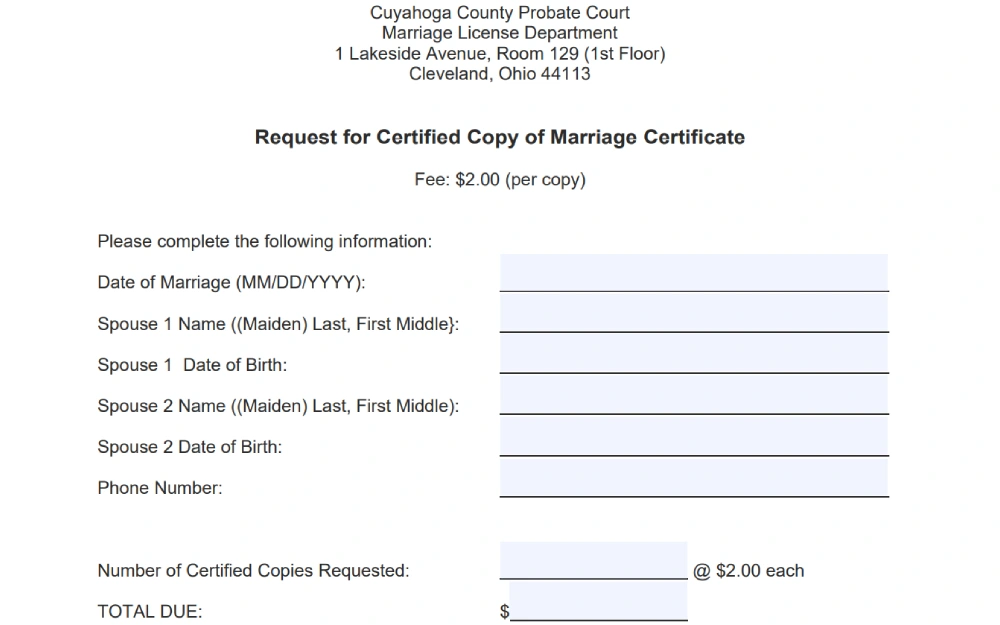
Certificates cost $2 each. It takes about two weeks to process these forms.
Cuyahoga County Probate Court
Marriage License Department
1 Lakeside Ave., Room 129 (1st Floor)
Cleveland, OH 44113
Phone: (216) 443-8920
Email: [email protected]
Refer to the Cuyahoga County marital information lookup process for further assistance and insight.
Find out who’s married in Cincinnati’s Hamilton County using the probate court’s marriage license search.7 This online index documents marriages in the county from January 1974 to present.
Enter one of the party’s names to search the county’s marriage record index to see the specifics about the union. Click the PDF button to view a scanned copy of the certified abstract of marriage, which can be printed or saved.
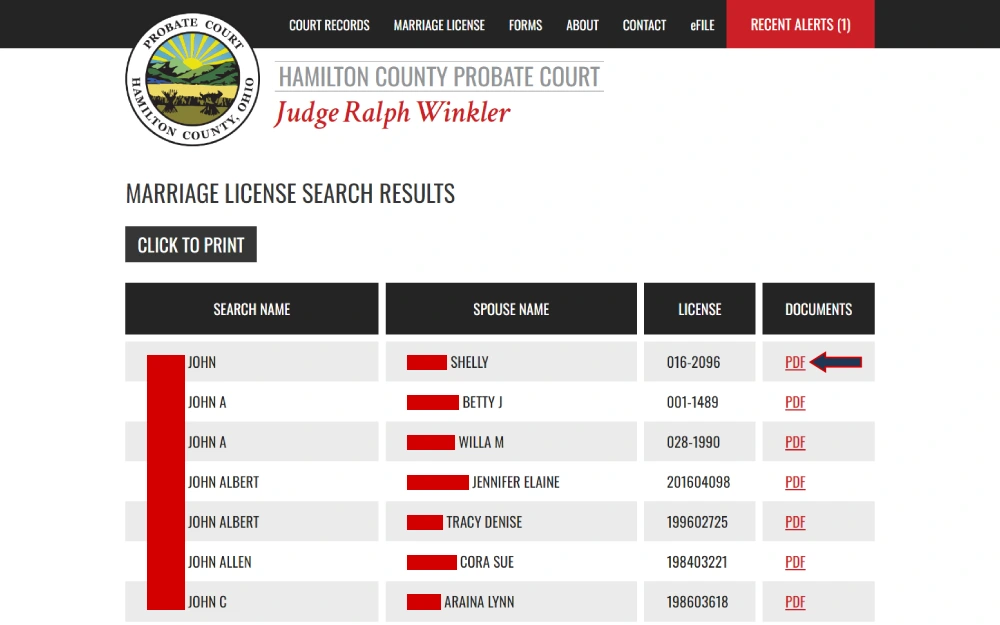
To obtain a copy of a marriage record in Hamilton County, citizens have plenty of options. First, they can request a copy using an online record request form and pay the $2 fee by credit card when ordering. Individuals can also complete the Application for Certified Abstract of Marriage form and deliver it in person or via mail, fax, or email.8
If applying by mail, include a self-addressed, stamped envelope and a cashier’s check for $3 (per copy) made payable to Hamilton County Probate Court. Citizens can also drop off their form at the Hamilton County Probate Court Office on the ninth floor in the file room. The Hamilton County Probate Court is open Monday through Friday from 8 a.m. to 4 p.m.
Hamilton County Probate Court
William Howard Taft Center
230 E. 9th St., 9th Floor
Cincinnati, OH 45202
Phone: (513) 946-3598
Fax: (513) 946-3626
Email: [email protected]
In Ohio, the county probate courts are the official marriage record custodian. So, if individuals search for a marriage license for a union in a major city – such as Dayton or Cincinnati – they’ll be directed to the county probate court for the record. Read on to learn more about how to access historical marriage archives to find out if someone is married in Ohio.
How To Find Archived Marriage Records in Ohio for Genealogy Research (Free)
The Ohio Bureau of Vital Statistics maintains a database of marriage record data from 1990 to 2020, with more recent reports added annually.
Citizens can download these annual reports to learn more about marriage trends in the state for that year. Each report highlights the total number of marriages in each Ohio county for that year. This data can provide interesting insight about marriages and divorces in Ohio.
For information on older marriage records, citizens can also explore state archives. Some of these records are housed at the Ohio History Center in Columbus.9 However, there’s no statewide database of marriages prior to 1950, so it’s important for record seekers to know where the couple married to narrow their search.
The Ohio History Center’s online catalog includes many marriage indexes recorded by county.10 Be sure to search by the county name, such as “Fairfield County marriage records” to bring up accurate results. These results will indicate whether the Ohio History Center has the marriage archive available.
If citizens find what they’re looking for in the online catalog search, they can visit the Ohio History Center to view the record, which may be available as microfilm indexes or physical copies. Located in Columbus, the Ohio History Center Archives & Library is open Wednesdays from 12:30 p.m. to 3 p.m. and Thursdays and Fridays from 10 a.m. to 3 p.m.
Individuals are encouraged to make an appointment online, but they can drop in as well.11 Staff is available to assist with research requests, photocopies, and more services.
If citizens can’t visit the Ohio History Center in person, they can make a records request online. To request public marriage licenses with a known date, individuals should complete the Indexed Vital Records Copy Request Form. Each record costs $18 plus 7.5% Ohio sales tax, payable by check or money order to the Ohio History Center.
If the marriage date is unknown, complete the Indexed Vital Records Research Request Form.12 Staff will search a 10-year time frame to find the marriage record. The search fee is $25 per name. Mail the form with required fees to the below address. It takes six to eight weeks to complete the request.
Ohio History Center
Archives and Library
800 East 17th Avenue
Columbus, OH 43211
Phone: (614) 297-2510
Email: [email protected]
While the History Center Archives has marriage record indexes for many counties, it does not have all county certificates. If citizens can’t find the record they’re looking for through the History Center, reach out to the county probate office, which also maintains historical marriage archives. Here are a few other resources that can assist in a marital records search:
- Newspaper archives, which may feature marriage announcements
- Church archives, which may document any unions at the religious institution
- Local libraries and genealogical societies, which may house such records
Common Law Marriage in Ohio
The state stopped recognizing common law marriages on October 10, 1991, according to Ohio’s Revised Code, Section 3105.12.13 However, common law marriages entered into in Ohio before October 10, 1991 remain recognized. Additionally, Ohio acknowledges common law marriages created in a state where they remain legal.
Some cities in Ohio recognize other non-traditional unions. While these unions are not legalized at the state level, several municipalities allow citizens to enter a domestic partnership. Several major cities, including Cleveland, Columbus, and Cincinnati, offer domestic partnerships.
Couples can formally record their union through the city’s domestic partnership registry, as detailed by the city of Cincinnati.14
Note: While each city has different guidelines on how this process works, individuals in cities that permit domestic partnerships can contact the city clerk’s office for additional information.
How To View Details of Common Law Married Couples in OH
Ohio couples who entered a common law marriage before October 10, 1991 did not formally report their union to the state.
So, there are no official marriage records of such a union, which can make researching common law marriages a bit more challenging. However, domestic partners register their marriage with the city, so record seekers may be able to confirm those unions.
While there isn’t an online domestic partnership registry to search, citizens can contact the city where the union was formed to get more information.
How To Apply for an Ohio Marriage License
Couples marrying in Ohio need to obtain a marriage license through the county probate court.15 While specific guidelines and cost vary by county, couples can expect to appear together in person at the probate court offices to apply for a marriage license.
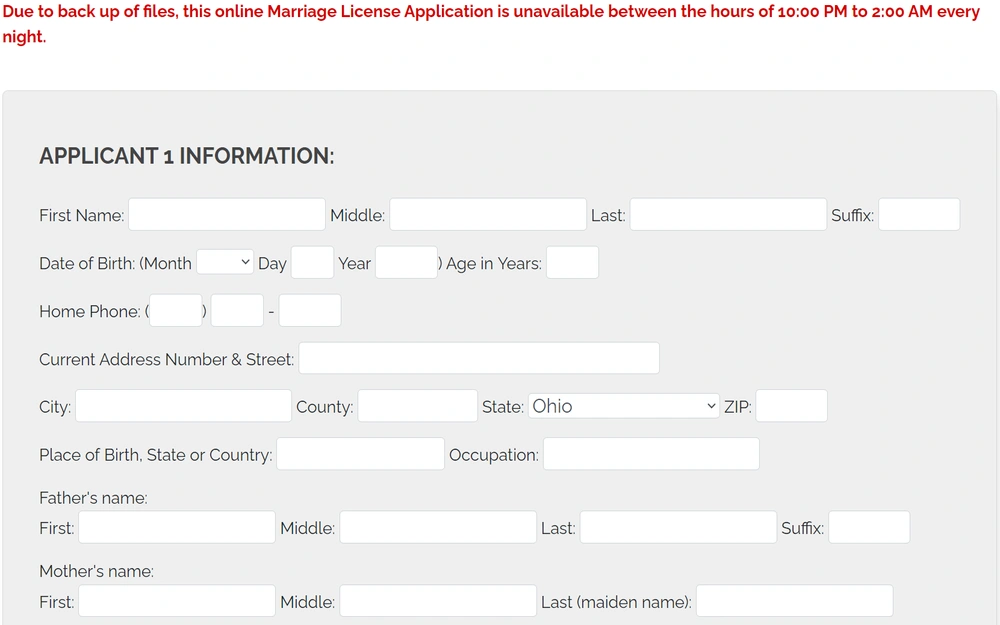
Couples who live in Ohio should apply for the license in the county where they live. Out-of-state applicants should apply for their license in the county where they will marry.
During the visit to the county probate office, couples can expect to submit a valid photo ID, such as a driver’s license or passport, and a completed application for marriage. Previously married individuals will need to show proof of divorce or annulment as well.
Marriage licenses vary in cost by county, and couples must pay the fee when they submit their application. There is no waiting period to marry after the license is issued. Marriage licenses expire in 60 days.
After the nuptials, the couple should sign their marriage license and return it to the county probate court. Then, they can request a certified copy of a marriage record as proof of their union.
This resource helps citizens understand how to access Ohio marriage records to aid in their personal and genealogical research; for other record types (divorces, warrants, criminal history, deaths, births, and more), check out the Ohio free public information search overview.
References
1Ohio Attorney General’s Office. (2023). The Yellow Book. Retrieved February 14, 2024, from <https://www.ohioattorneygeneral.gov/YellowBook>
2United States Census Bureau. (2022). Marital Status and Marital History (Table ACSST1Y2022.S1201). Retrieved February 14, 2024, from <https://data.census.gov/table/ACSST1Y2022.S1201?q=Marital%20Status%20and%20Marital%20History&g=040XX00US39>
3Franklin County Probate Court. (n.d.). Ohio Probate Courts. Retrieved February 14, 2024, from <https://probate.franklincountyohio.gov/about/ohio-probate-courts>
4Franklin County Probate Court. (n.d.). Marriage License Index. Retrieved February 14, 2024, from <https://probate.franklincountyohio.gov/record-search/marriage-license-index>
5Cuyahoga County Probate Court. (n.d.). Public Access. Retrieved February 14, 2024, from <https://probate.cuyahogacounty.us/pa/>
6Cuyahoga County Probate Court. (n.d.). Certified Copy Request Form [PDF]. Retrieved February 14, 2024, from <https://probate.cuyahogacounty.us/pdf/ml/CertifiedCopyRequestMRG.pdf>
7Hamilton County Probate Court. (n.d.). Court Record Search. Retrieved February 14, 2024, from <https://www.probatect.org/court-records/court-record-search>
8Hamilton County Probate Court. (n.d.). Application for Exemplified Copy [PDF]. Retrieved February 14, 2024, from <https://www.probatect.org/docs/default-source/default-document-library/application_for_exemplified.pdf>
9Ohio History Connection. (2024, January 11). Vital Records – Marriage Records. Retrieved February 14, 2024, from <https://ohiohistory.libguides.com/vital/marriagerecords>
10Ohio History Connection. (n.d.). Archival Resource Catalog. Retrieved February 14, 2024, from <https://aspace.ohiohistory.org/>
11Ohio History Connection. (n.d.). Event Calendar. Retrieved February 14, 2024, from <https://ohiohistory.libcal.com/>
12Ohio History Connection. (2023, May 22). Indexed Vital Records Research Request Form. Retrieved February 14, 2024, from <https://ohiohistory.libguides.com/ld.php?content_id=74981196>
13Ohio Laws and Rules. (2004, May 7). Ohio Revised Code Section 3105.12. Retrieved February 14, 2024, from <https://codes.ohio.gov/ohio-revised-code/section-3105.12>
14The City of Cincinnati. (n.d.). Domestic Partners Registry FAQs. Retrieved February 14, 2024, from <https://www.cincinnati-oh.gov/council/domestic-partners-registry/faqs/>
15Franklin County Probate Court. (n.d.). Marriage License Requirements. Retrieved February 14, 2024, from <https://probate.franklincountyohio.gov/marriage-license-requirements>
